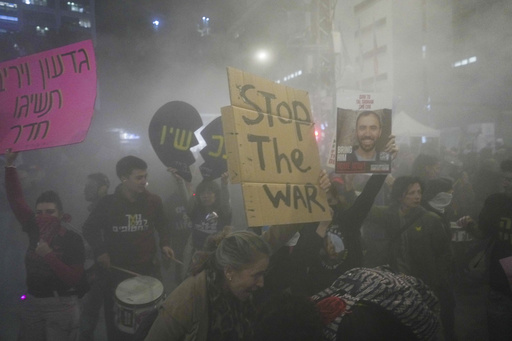DEIR AL-BALAH, Gaza Strip — In a significant development regarding the ongoing conflict in Gaza, Israeli Prime Minister Benjamin Netanyahu has dispatched Mossad’s director, David Barnea, to participate in ceasefire negotiations in Qatar, as announced by his office on Saturday. This decision indicates that discussions are advancing, although the exact timing of Barnea’s travel to Doha for further indirect negotiations between Israel and the Hamas militant organization remains uncertain. Pressure is mounting from the United States for an agreement to be finalized ahead of the presidential inauguration scheduled for January 20. Barnea’s involvement highlights that senior Israeli officials, who would need to approve any terms, are now taking part in the dialogue.
The conflict, which has lasted for 15 months, has only seen one brief ceasefire, occurring during the initial weeks of hostilities. Since that time, efforts to negotiate peace—mediated by the United States, Egypt, and Qatar—have consistently faltered. Currently, discussions are centered around a phased ceasefire. Netanyahu has expressed that he is inclined to commit only to an initial stage, which would involve a partial release of hostages in exchange for a temporary halt in combat operations lasting several weeks. On the other hand, Hamas is demanding a complete withdrawal of Israeli forces from the severely impacted region, while Netanyahu maintains that the overarching goal is to diminish Hamas’s military capabilities in Gaza. According to statements from Gaza’s Health Ministry, more than 46,000 Palestinian lives have been claimed in the conflict, predominantly involving women and children, without specifying how many casualties were combatants.
Additionally, Netanyahu is sending other high-level officials, including the leader of Israel’s Shin Bet internal security service and various military and political advisers, to Qatar as well. This strategic move follows discussions that occurred between Netanyahu, his defense minister, security leaders, and negotiators representing both the outgoing and incoming U.S. administrations. A photograph was also issued by Netanyahu’s office featuring him alongside Steve Witkoff, the incoming special envoy to the Middle East for President-elect Donald Trump, who was present in Qatar earlier this week.
Families of the approximately 100 hostages who were taken during the Hamas attack on October 7, 2023, continue to push for a resolution that will bring their relatives home. On Saturday evening, demonstrations took place in Tel Aviv, where citizens displayed photos of the captives. “We unite in the hope that the negotiations in Doha yield positive results,” stated Jack Lew, the outgoing U.S. Ambassador, during the rally. “We find some encouragement in today’s developments, but we must keep our efforts ongoing.” The retrieval of two hostages’ bodies in the past week has amplified concerns over the urgency of the situation, with Hamas stating uncertainty about the status of those taken in the assault.
The demand from representatives of families of hostages is clear: “Return with an agreement that guarantees the safety of all hostages—alive for rehabilitation and deceased for proper burial back home.” U.S. Secretary of State Antony Blinken indicated earlier this week that a prospective deal is “very close,” expressing hopes to finalize it before handing diplomatic responsibilities to the incoming Trump administration. However, such optimism has been expressed multiple times throughout the past year, yet the outcome remains uncertain. Crucial discussions in the negotiations revolve around which hostages might be released in the initial phase of any ceasefire arrangement and what Palestinian prisoners may be included, as well as the extent of any expected Israeli military pullback from densely populated areas in Gaza.
The human toll of the conflict has been severe. The initial attack by Hamas and other factions resulted in around 1,200 fatalities while also taking about 250 hostages to Gaza. A temporary ceasefire in November 2023 resulted in the release of over 100 hostages, while others have been freed or have perished since the conflict began. Recently, the Israeli military disclosed the deaths of four soldiers in northern Gaza, without providing additional specifics. The total military fatalities in the conflict now exceeds 400, including six who died this week in northern Gaza amid a focused Israeli campaign against regrouping Hamas militants. The Israeli military claims to have eliminated over 17,000 militant fighters throughout the fighting, although it has not substantiated these figures.
On the ground in Gaza, the impact of warfare has been devastating. An airstrike reportedly killed a 5-year-old girl and two male relatives in Deir al-Balah, as confirmed by medical personnel at Al-Aqsa Martyrs Hospital. The girl, dressed in a pink sweater, was found lifeless and her father, heartbroken, mourned deeply. Additional Israeli airstrikes resulted in multiple casualties, including at least eight Palestinians—among them children and women—who died in a school serving as a makeshift shelter in northern Gaza. The Civil Defense, associated with the Hamas-controlled government, reported that the strike on Halawa school also injured about 30 others. In response, the Israeli military stated that the target was a Hamas command center situated within the school, though they have not provided evidence to support this claim. Overall, the Gaza Health Ministry reported that 32 bodies had been received by hospitals in the last 24 hours alone.
In a poignant plea to the global community, Hamza Saleh, a resident of Khan Younis, voiced the struggles of Gaza’s 2.3 million populace—primarily those who are displaced and facing increasing starvation as they seek aid. “I ask the world, do you hear us? Do we exist?” he implored, as scenes of desperation unfolded around him.




